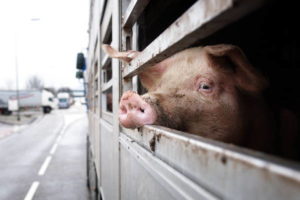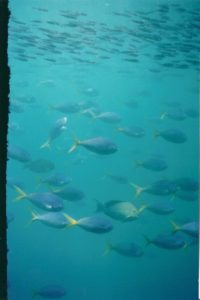Worldlog 17 de abril 2017
“Mientras haya mataderos, habrá campos de batalla”. Una cita histórica de Tolstoi, el gran escritor, filósofo y pensador político ruso, que sigue siendo muy actual. A finales de marzo salieron a la luz imágenes muy duras grabadas de forma clandestina por Animal Rights, organización que lucha por el bienestar animal. La grabación mostraba un matadero de la localidad belga de Tielt donde se incumplen estructuralmente todas o casi todas las normas de bienestar animal y seguridad alimentaria.
Terrible, pero no sorprendente. Si pensamos que en Holanda se sacrifican 650 cerdos cada hora y que los controladores no disponen ni de cinco segundos para evaluar a cada cerdo, también tenemos muchos motivos para preocuparnos por el trato que reciben los animales en los mataderos holandeses. Por eso hicimos una propuesta parlamentaria para introducir sistemas de videovigilancia obligatorios en los mataderos. ¡Y con éxito! Nuestra propuesta ha obtenido el apoyo de una amplia mayoría. Un paso importante hacia una mayor transparencia, para que la industria de la carne se tome más seriamente el bienestar animal y el consumidor adquiera mayor conciencia sobre el origen de la carne que tiene en el plato. Porque, como dijo Paul McCartney: “Si los mataderos tuvieran paredes de cristal, todo el mundo sería vegetariano”.

También ha habido noticias preocupantes sobre el mundo submarino. El coral del Caribe corre el riesgo de desaparecer en el plazo de quince años y muchas partes de la Gran Barrera de Arrecifes australiana también se están viendo afectadas por el calentamiento del agua marina. Para salvar el coral debemos apresurarnos a reducir considerablemente la cantidad de CO2 que emitimos entre todos a la atmósfera. En Europa, por fortuna, ya han reducido notablemente sus emisiones muchos países, entre los que destaca Gran Bretaña con una reducción del 30%, logro alcanzado, entre otros motivos, por la introducción de una tasa sobre la emisión de CO2. Una medida muy efectiva por la cual aboga también el Partido por los Animales.
Pero a pesar de todo, Europa debe multiplicar aún por dos la velocidad de las reducciones si queremos cumplir los objetivos fijados en París. Holanda —donde las emisiones de CO2 han alcanzado incluso el nivel más alto de la historia— debe dar pasos aún más grandes.

Pasos que solo se podrán dar si los gobiernos abandonan el mantra del crecimiento y abrazan un sistema económico basado en la capacidad del planeta y de la sociedad. Un sistema en el que seamos más que trabajadores, consumidores y capitalistas. Kate Raworth, del Oxford University’s Environmental Change Institute, ha concebido un nuevo modelo económico de ese tipo: el donut. Lee aquí este interesante artículo sobre el tema.
Buenos resultados en las elecciones municipales en Finlandia, con muchos votos recibidos, aunque por desgracias no suficientes para obtener un escaño en uno de los seis municipios participantes. Pero como ha dicho nuestro partido hermano finlandés: “Muy satisfechos con el resultado obtenido con un equipo muy pequeño y un presupuesto muy limitado”.
¡Hasta pronto! Cordialmente,
Marianne
‘As long as there are slaughterhouses there will always be battlefields.’ A historic quote by Tolstoj, the Russian writer, philosopher and political thinker. At the same time, it is still a topical quote. At the end of March, some highly confronting undercover images taken by the animal welfare organisation Animal Rights were published, which showed that almost all rules and regulations for animal welfare and food safety were structurally violated in a slaughterhouse in Tielt in Belgium.
Shocking, but not surprising. Knowing that 650 pigs are slaughtered every hour in the Netherlands and that inspectors get not even five seconds to check a pig causes also great concern about the treatment of animals in Dutch slaughterhouses. That is why we made a plea in the Lower House for mandatory CCTV in slaughterhouses. And we did so successfully. Our motion was adopted by a great majority. An important step towards more transparency, thus forcing the industry to take animal welfare more seriously and the consumer to be more conscious of the meat on his or her plate. And to quote Sir Paul McCartney: ‘If slaughterhouses had glass walls, everyone would be a vegetarian’.

There were shocking messages concerning our underwater world. The corals in the Caribbean are threatened to vanish within fifteen years and large parts of the Australian Great Barrier Reef are affected by severe bleaching due to the warming of seawater. To save the corals, we should all immediately reduce the emission of greenhouse gases into the atmosphere. Fortunately, many countries in Europe reduced their emissions considerably already. With Great Britain as a positive peak, which reached a reduction of 30 per cent, partly due to the introduction of its CO2 prices. An efficient instrument which is advocated by the Party for the Animals too.
Yet, greenhouses gases in Europe must be reduced twice as fast to meet the Paris climate goals. And the Netherlands – where the emission of greenhouse gases increased to the highest level ever! – still has to make great efforts.

Efforts that can only be achieved if the governments set aside their destructive mantra of growth, growth, growth. And change to an economic system that is based on the capacity of the earth and society. A system where we are more than just employees, consumers and owners of capital. Kate Raworth of Oxford University’s Environmental Change Institute thought up such new economic model: The Doughnut. Read here the interesting article about it.
Great results at the municipal elections in Finland. Many votes obtained. But unfortunately just not enough to obtain a municipal council seat in one of the six participating municipalities. But as our Finnish sister party pointed out ‘A great result with a small team and a small budget.’
Until soon. Kind regards,
Marianne